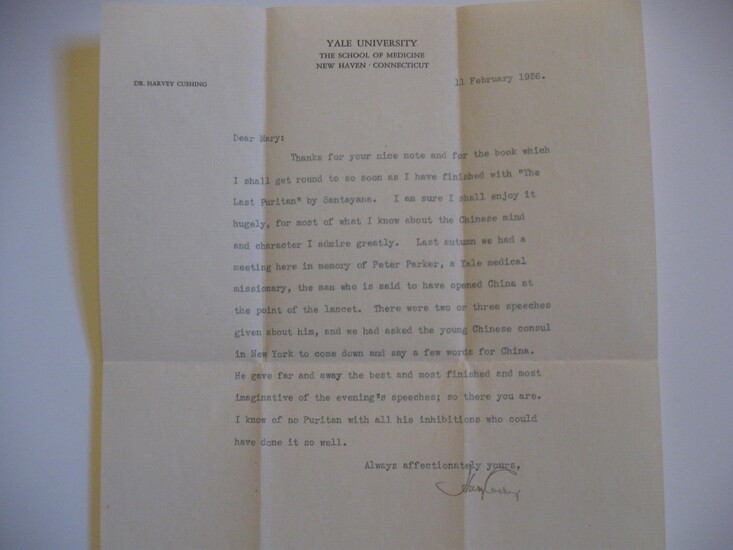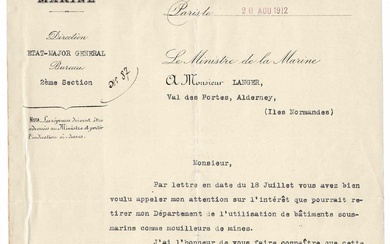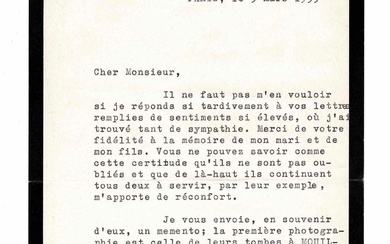Typed Letter, Signed to Mary Foster, Riverside, Connecticut, wife of Elon Foster (February 11, 1936) about Santayana's The Last Puritan and with comments on the Chinese mind and character.
By CUSHING. Harvey
Very Good. Letterhead: Yale University/ The School of Medicine/ New Haven Connecticut/ Dr. Harvey Cushing. Dear Mary: Thanks for your nice note and for the book which I shall get around to as soon as I have finished with "The Last Puritan" by Santayana. I am sure I shall enjoy it hugely, for most of what I know about the Chinese mind and character I admire greatly. Last autumn we had a meeting here in memory of Peter Parker, a Yale medical missionary, the man who is said to have opened China at the point of the lancet. There were two or three speeches given about him, and we had asked the young Chinese consul in New York to come down and say a few words for China. He gave far and away the best and most finished and most imaginative of the evening's speeches; so there you are. I know of no Puritan with all his inhibitions who could have done it so well. Always affectionately yours, Harvey Cushing (signed). "By 6 February [1936] H.C. was home again after eight weeks in hospital. He spent the first month at home annotating his books and dispatching an occasional bibliographical enquiry to Klebs. In one of them he made an interesting comment on Santayana: '. . . You want to know what I thought about The Last Puritan. It is so long since I have read it I have almost forgotten. What is more I read it rapidly in large blocks, whereas Santayana told Elsie that it should be read only a paragraph or two a day to get what he really meant out of it. It seemed to me that the book was more revealing about Santayana than it was about the last Puritan. And I wondered whether if he had written it before he was appointed Professor of Philosophy at Harvard, he would ever have been appointed; or to put it another way, if the Harvard Corporation could have foreseen that he would write this novel twenty-five years after leaving Harvard, would they have hesitated to take him on the Faculty? . .' " (Fulton, Harvey Cushing, pp.670-71). "While Cushing did not like the passing of the old order in America, he did not identify with the conservative dinosaurs satirized in two of the popular novels of 1930s: John P. Marquand's The Late George Apley and George Santayana's The Last Puritan. He had known those types in Boston inbred, hidebound, narrow-minded descendants of old families, who set their faces against all kinds of change. Cushing enjoyed seeing them mocked in fiction. Of course, he knew he was a puritan--some of his friends teased him that he was the true last Puritan--but his achievement in life was nothing if not progressive" (Bliss, Harvey Cushing, p. 497).
Published by: 1936., 1936
Vendor: Scientia Books, ABAA ILAB
Buy Now on
By CUSHING. Harvey
Very Good. Letterhead: Yale University/ The School of Medicine/ New Haven Connecticut/ Dr. Harvey Cushing. Dear Mary: Thanks for your nice note and for the book which I shall get around to as soon as I have finished with "The Last Puritan" by Santayana. I am sure I shall enjoy it hugely, for most of what I know about the Chinese mind and character I admire greatly. Last autumn we had a meeting here in memory of Peter Parker, a Yale medical missionary, the man who is said to have opened China at the point of the lancet. There were two or three speeches given about him, and we had asked the young Chinese consul in New York to come down and say a few words for China. He gave far and away the best and most finished and most imaginative of the evening's speeches; so there you are. I know of no Puritan with all his inhibitions who could have done it so well. Always affectionately yours, Harvey Cushing (signed). "By 6 February [1936] H.C. was home again after eight weeks in hospital. He spent the first month at home annotating his books and dispatching an occasional bibliographical enquiry to Klebs. In one of them he made an interesting comment on Santayana: '. . . You want to know what I thought about The Last Puritan. It is so long since I have read it I have almost forgotten. What is more I read it rapidly in large blocks, whereas Santayana told Elsie that it should be read only a paragraph or two a day to get what he really meant out of it. It seemed to me that the book was more revealing about Santayana than it was about the last Puritan. And I wondered whether if he had written it before he was appointed Professor of Philosophy at Harvard, he would ever have been appointed; or to put it another way, if the Harvard Corporation could have foreseen that he would write this novel twenty-five years after leaving Harvard, would they have hesitated to take him on the Faculty? . .' " (Fulton, Harvey Cushing, pp.670-71). "While Cushing did not like the passing of the old order in America, he did not identify with the conservative dinosaurs satirized in two of the popular novels of 1930s: John P. Marquand's The Late George Apley and George Santayana's The Last Puritan. He had known those types in Boston inbred, hidebound, narrow-minded descendants of old families, who set their faces against all kinds of change. Cushing enjoyed seeing them mocked in fiction. Of course, he knew he was a puritan--some of his friends teased him that he was the true last Puritan--but his achievement in life was nothing if not progressive" (Bliss, Harvey Cushing, p. 497).
Published by: 1936., 1936
Vendor: Scientia Books, ABAA ILAB





